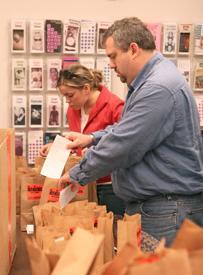Make good choices.
That’s the message three first-year nursing students from UNC-Chapel Hill plan to promote during the next two days on campus while handing out free spring break safety kits to students.
Jennifer Farmer, Megan Johnson and Ed Dills, along with several student volunteers, spent time last week packing about 500 brown paper bags with condoms, first aid items and health information for distribution this week.
They created the project during their work at the Student Health Center, part of the required public health rotation for UNC-CH’s nursing program.
“We were looking at stats of STDs [in college students] — it was kind of shockingly high,” Johnson said. “Spring break is a good time to bring up some of those safety issues.”
Johnson said their aim was to “be realistic” about students’ spring break habits.
“You can still party and have fun, but there are safe ways and unsafe ways of doing it,” Johnson said.
Besides some of the consumable items, the group also included several travel-sized documents that can help students measure their blood alcohol content or provide information about alcohol poisoning.
The trio also published a pamphlet, compiled with information from other Health Center fliers, that gives students tips for activities like road trips, traveling abroad and tanning.
“There was an overwhelming amount of information,” Farmer said. “When you break it down into the essentials it’s much more effective.”
The package even includes a business card-sized listing of phone numbers for U.S. embassies in popular spring break destinations like Mexico and the Bahamas.
The Health Center donated all of the material for the kits. The group originally planned to include suntan lotion from Johnson & Johnson, but they said the company backed out of the agreement.
According to Marianne Turnbull, director of health promotions, the Health Center’s clinical setting program has only been available to nursing students since fall 2007. Since then, the Health Center has received three nursing students for both the fall and spring semesters. Each group must plan and implement a major project while serving in the program.
But the safety kit distribution is just a minor project, Farmer said. The group’s major project will be a health expo during April.
Farmer said the fact that the package is free might entice students to grab a bag, but Johnson pointed out that just getting the information to students is the important thing.
“Whether they’re going to be all about it doesn’t matter,” Johnson said. “We just want them to take it.”








